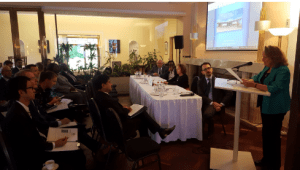The Judges of the Residual Special Court today published ‘Bearing the Greatest Responsibility: Select
Jurisprudence of the Special Court for Sierra Leone’, a digitized Volume of the consolidated judgements
of the Special Court for Sierra Leone (SCSL). The SCSL wrapped up its work in December 2013 after the
successful completion of its mandate, and was succeeded by the RSCSL. Part of the RSCSL’s mandate is
to ensure the SCSL’s legacy.
The Volume may be downloaded without cost from the RSCSL’s website, at www.rscsl.org, and may be cited freely.
 Justice Shireen Avis Fisher (pictured), who oversaw the production of this Volume, briefed diplomats in The Hague to coincide with today’s launch. In the briefing, which was hosted by Canada, Justice Fisher highlighted the Court’s unique contributions to its jurisprudence on the use of child soldiers in conflict, terrorism, forced marriage as a crime against humanity, head of state immunity, and attacks directed against UN peacekeepers.
Justice Shireen Avis Fisher (pictured), who oversaw the production of this Volume, briefed diplomats in The Hague to coincide with today’s launch. In the briefing, which was hosted by Canada, Justice Fisher highlighted the Court’s unique contributions to its jurisprudence on the use of child soldiers in conflict, terrorism, forced marriage as a crime against humanity, head of state immunity, and attacks directed against UN peacekeepers.
‘Bearing the Greatest Responsibility’ is a searchable verbatim compilation of the judgements of the SCSL, organized according to subject matter, and broken down by crime, case, facts, location, and legal analysis. This volume will be of use to international courts, some of which have already looked to SCSL precedents, as well as to prosecutors, jurists, legal scholars, international institutions, human rights activists, and other interested persons.
In addition to the legal analysis, the factual findings contained in the judgements represent an undeniable record of the atrocity crimes proven to have been committed against the people of Sierra Leone during the country’s eleven-year civil war, and as such will also be useful to a wider audience, including to the people of Sierra Leone, to enhance their understanding of their history.
The briefing in The Hague will be followed next month by a lecture at the Sierra Leone Law School in Freetown by Justice Emmanuel Roberts.
Eleven of the Fourteen Chapters in the volume highlight the specific international crimes to which civilians in Sierra Leone were subjected, including sexual slavery, murder, rape, mutilation and pillage.
In her dedication, Justice Fisher acknowledged the people of Sierra Leone who came forward to testify during the trials before the Court: “Those voices speak through the judgments and those voices should be heard not only by professionals but by the people of Sierra Leone. It is to the people of Sierra Leone that this book is dedicated, in the hope that we have made more accessible to them the record of the crimes perpetrated against them – not as a tragic reminder of the horrors of war, but as a tribute to their courage and resilience, and as a weapon against any who might deny the atrocities they suffered and overcame.”











